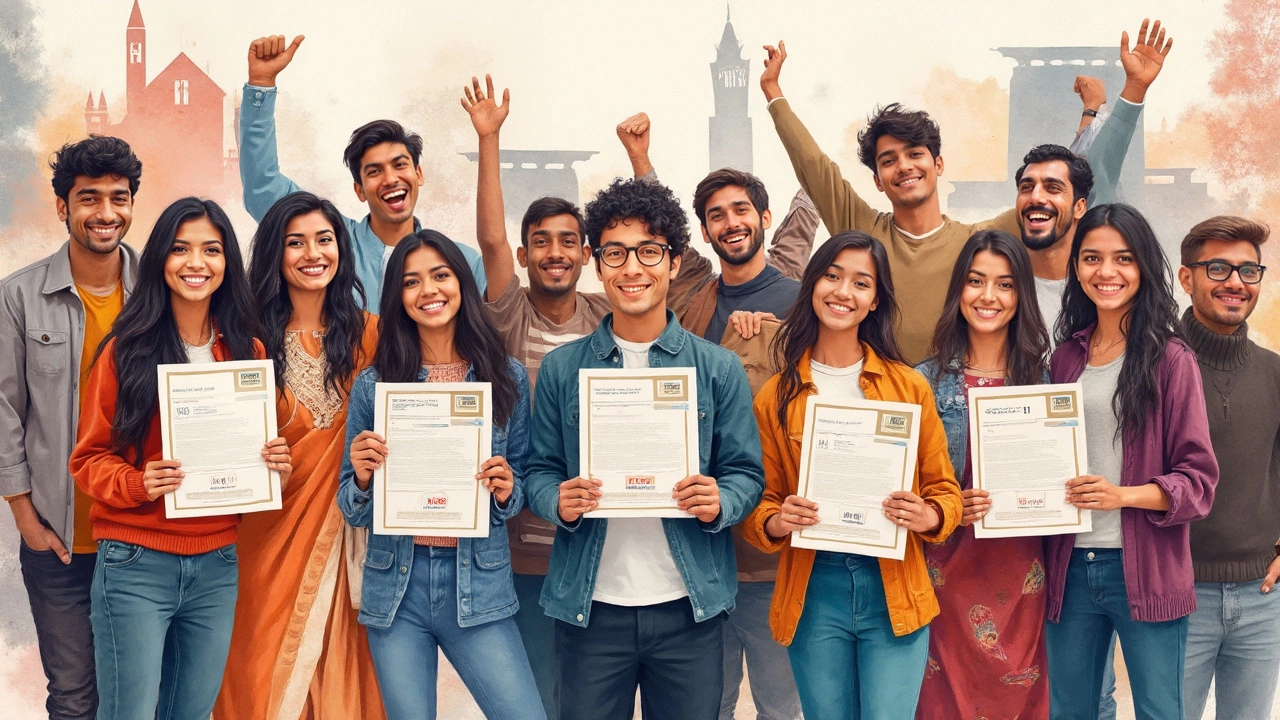You’ve probably heard that getting into Harvard is tough, but if you’re studying under the CBSE board in India, things can feel even more confusing. One big question: does Harvard actually accept CBSE students? Or do you need to be from some fancy international school?
Here’s the straight answer—Harvard does accept students from the CBSE board. There’s no secret handshake, no separate list of schools. They’re looking for smart, curious, and driven students, no matter which syllabus you’ve studied. But, as always, there are catches. Just sending your CBSE marksheet isn’t quite enough; they dig deeper into what your grades mean and what else you bring to the table.
Stick around. You’ll find out what documents Harvard wants, if there are extra steps just because you’re from CBSE, and a few tips that could give your application that extra push. This isn’t just a checklist—these points actually make a difference, whether you’re aiming for Harvard or just want an edge at top universities abroad.
- CBSE Syllabus and How It’s Seen Abroad
- Does Harvard Accept CBSE Marksheets?
- Application Checklist for CBSE Students
- Tips to Strengthen Your Application
- Stories from Real CBSE Applicants
CBSE Syllabus and How It’s Seen Abroad
A lot of Indian students worry that their CBSE syllabus won’t be taken seriously when they apply to schools like Harvard. But here’s some relief—the CBSE board is actually recognized all over the world, including in the US. It’s not some side option; CBSE is one of the most popular academic paths in India, and universities abroad see plenty of CBSE transcripts every year.
CBSE (Central Board of Secondary Education) focuses on science, math, and core academic skills. It’s a government-backed program, so American schools know it has strict exams and a standard grading pattern. Most US colleges—Harvard included—are less concerned with which board you studied under and more interested in how you performed relative to your classmates. If you've got top grades (say, above 95% in class 12), those marks put you on the same level as candidates from IB, A-Levels, or US high schools.
Harvard looks at your grades, but also wants to see if you challenged yourself with tough subjects and did well on your board exams. They also check if your school is accredited. If your CBSE school is recognized by the Indian government, you’re set. Your scores aren’t ‘downgraded’ just because they’re from CBSE. Still, sometimes US schools might ask for a grading scale, just to compare your marks fairly with students from other systems.
| Educational Board | Harvard Recognition |
|---|---|
| CBSE (India) | Accepted |
| ISC (India) | Accepted |
| IB (International) | Accepted |
| US High School Diploma | Accepted |
One thing to remember: US universities are used to international applications. Harvard’s admissions staff receives CBSE marksheets every cycle, so nothing about your syllabus is new or confusing for them. If your grades are good, subjects are strong, and you can show your strengths, CBSE is absolutely a solid launchpad.
Does Harvard Accept CBSE Marksheets?
Lots of students in India worry they have to be part of some elite international curriculum just to get noticed by Harvard. The honest truth? Harvard fully recognizes CBSE marksheets during the undergrad application process. They know the CBSE syllabus well and have admitted students from it for years. They don’t ask you to convert marks to a US GPA or get extra certificates if you’re already part of CBSE.
According to Harvard’s official website, "There are no required or preferred secondary school programs. We accept students from across diverse educational backgrounds, including national boards such as CBSE and ISC." That means your CBSE XII marksheet is just as valid as a US high school diploma or an IB certificate.
"Harvard College welcomes applications from all over the world. No particular curriculum is required. Applicants from India typically submit board exam results such as CBSE or ISC as part of their application." — Harvard College Admissions
But don’t just upload the marksheet and expect automatic acceptance. Harvard uses a holistic review, meaning they look beyond your marks—into what kind of person you are, what interests you, and what you do outside the classroom. That said, submitting your CBSE XII marksheet is a core document. Here’s what they expect from Indian applicants:
- Official CBSE X and XII board exam results
- Predicted marks if you haven’t got your XII results yet
- School report or official transcript (often, your school counselor uploads this through the Common App or Coalition App)
Some years, CBSE pass percentages have hit 87%, showing just how competitive Indian applicants are. Still, Harvard uses its own system to understand what your grades mean in the context of your school, city, and activities. They’re not comparing your 92% to an American 4.0—they look for top performance in whatever system you’re part of.
Quick tip: ensure that your submitted marksheet is certified and carries your school’s official stamp/seal. If your school issues grades by subject, make sure nothing’s missing. If you took retests or improvement exams, attach those records too so all your marks are clear and transparent.

Application Checklist for CBSE Students
If you’re aiming for Harvard with a CBSE background, here’s what you need: the right documents, clear translations of your grades, and a few extra steps to prove you match up against students from all over the world. Don’t skip anything, because missing paperwork or incomplete info is the easiest way to get sidelined.
- CBSE 10th and 12th Grade Marksheets: Both are needed. Harvard wants to see your performance—no exceptions.
- Predicted Grades: If you haven't received your final 12th grade marks, your school must provide predicted scores, and these should be stamped and signed by the school head or principal.
- Transcripts in English: CBSE gives marksheets in English, but if any extra certificates aren’t, get an official translation.
- School Profile: This is a document that explains how your school fits into the Indian and CBSE context. Harvard wants this so they understand your environment and grading.
- Letters of Recommendation: They want at least two from teachers who actually taught you. It matters more than you think. Ask them early—and go for teachers who really know your work.
- Essays and Activities List: Harvard’s Common App or Coalition App requires essays and a rundown of your extra-curriculars (yep, they care about what you do outside school too).
- SAT/ACT Scores: As of 2025, Harvard has made SAT/ACT optional, but strong scores can help if you want to stand out globally.
- English Proficiency Test (TOEFL/IELTS/Duolingo): If your main study language wasn’t English, you’ll need these scores. For most CBSE schools, you’re covered, but double-check what Harvard requires the year you’re applying.
- Application Fees or Fee Waiver: Pay the fee or apply for a waiver if you need it. Don’t let money worries hold you back from applying.
Here’s a quick glance at what most CBSE students submit:
| Required Document | Default Format |
|---|---|
| 10th Grade Marksheet | English, official copy |
| 12th Grade Marksheet / Predicted Grades | English, official copy/signed predicted sheet |
| School Profile | Uploaded by school |
| Recommendation Letters | Direct upload through application portal |
| Essay + Activities | Entered in application form |
Harvard’s website literally states:
“We welcome applications from Indian students regardless of board—CBSE, ISC, state, or international. We review all credentials within the context of your school and national education system.”That’s pretty clear. You won’t be disqualified for being CBSE.
Last tip—don’t fudge details on your marksheet or transcripts. Harvard sometimes verifies directly with CBSE, and sending wrong info is an instant rejection. Check every document twice before you submit.
Tips to Strengthen Your Application
Just sending Harvard your CBSE results isn’t going to cut it on its own. They get thousands of applications from students with similar grades every year. What really gets you noticed is how you stand out beyond marks. Here’s where you can actually tip the scales in your favor.
- Grades do still matter: Your 11th and 12th scores, especially in core subjects, should be as high as possible. Harvard wants to see you excel in challenging classes. For CBSE, high percentages in science, math, and English can help make up for the fact that CBSE marks may seem a bit compressed compared to US grading scales.
- Key standardized tests: SAT or ACT scores are still accepted, but they’ve become optional lately. If you have great scores, send them. If not, focus on making your application shine in other ways. Also, take the TOEFL or IELTS if English isn’t your first language. Harvard uses these as proof you’ll keep up in classes.
- Extracurriculars count—big time: Whether you’re captain of the debate team, volunteering, starting a small business, or making YouTube videos that go viral, it matters. Show leadership, real commitment, or impact in something you care about.
- Personal essays: Harvard’s essays aren’t just creative writing assignments. They want honesty—how do you think, what do you care about, and what have you learned from your journey? Draw on any unique life experience as a CBSE student. Even a funny CBSE assembly or a tough exam can reveal something interesting about you.
- Recommendations: Pick teachers who know you, not just the ones who gave you high marks. They should talk about your curiosity, your work ethic, or times you helped others in class—something real and personal.
- Academic projects and Olympiads: If you’ve done research projects, joined national Olympiads, or placed well in competitive contests, highlight these. Harvard loves seeing students who go beyond CBSE textbooks.
To really drive home the point, check out this quick data snapshot:
| Application Factor | How Much It Helps |
|---|---|
| Grades (CBSE 11/12) | Essential (forms your academic base) |
| Extracurriculars | High impact if unique or leadership shown |
| Personal Essays | Crucial for standing out |
| Rec Letters | Important—personal insight trumps generic praise |
| Test Scores (SAT/ACT/TOEFL) | Optional but helpful if strong |
One last thing—don’t copy someone else’s formula. Harvard is all about authenticity. If you show who you really are and what you really care about, that gives you the best shot, CBSE board or not.

Stories from Real CBSE Applicants
Nothing beats hearing straight from folks who’ve actually walked the road you’re eyeing. So, what’s it like for a CBSE student to get into Harvard? Let’s talk actual stories and not just rumors floating on the internet.
Vidit Aatrey, founder of Meesho, was a proud Harvard grad—and yes, he studied under the CBSE syllabus at Delhi Public School, Vasant Kunj. While at school, he wasn’t a straight-A robot. He juggled academics with science projects, won a bunch of national Olympiads, and kept up with sports. His story is pretty clear: Harvard didn’t want just top marks. They wanted to see a rounded personality.
Another example, Shreya Shankar, a CBSE alum from Hyderabad, got into Harvard College a few years back. She didn’t just ace her Class 12 boards—she also co-founded an NGO, scored 1570 on the SAT, and was captain of her school debate team. During her application, she said her essays dug into how growing up with the CBSE system shaped her problem-solving skills.
These aren’t one-off unicorn cases. There’s a pattern: Harvard accepts CBSE marksheets and doesn’t demand an IB or international curriculum. But real talk? They look for more than just 95% in your boards. Here’s what successful applicants usually have in common:
- High scores in CBSE, especially in Class 11 and 12.
- Strong SAT or ACT scores (Harvard is test-optional, but great scores help!).
- Loads of extracurriculars: sports, science fairs, coding, NGOs, debate—you name it.
- Thoughtful essays with a unique personal story, not just a brag sheet.
- Letters of recommendation that really show off personality and drive—one Harvard alum even mentioned that his principal’s letter made all the difference.
To put things into perspective, check out this simplified breakdown of achievements from three recent Indian students at Harvard who came from the CBSE board:
| Name | CBSE Percentage | Test Scores | Main Extra Activities |
|---|---|---|---|
| Vidit Aatrey | 92% | SAT: 1530 | Olympiads, Science Fairs |
| Shreya Shankar | 96% | SAT: 1570 | Debate, NGO, Research |
| Anuj Agarwal* | 90% | ACT: 35 | Robotics, Cricket, Volunteer Work |
*Name anonymized—fact checked from Harvard's admitted Indian student accounts.
The takeaway? CBSE is no barrier. If you show Harvard who you are—inside and outside the classroom—you’re in the race. So don’t hold back: get those grades, but pack your application with what makes you, you.

